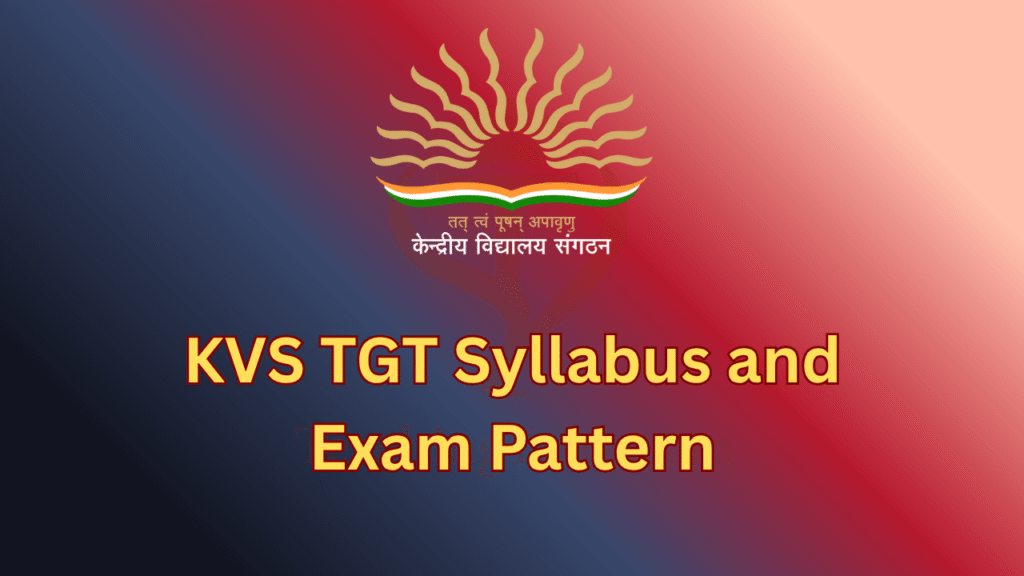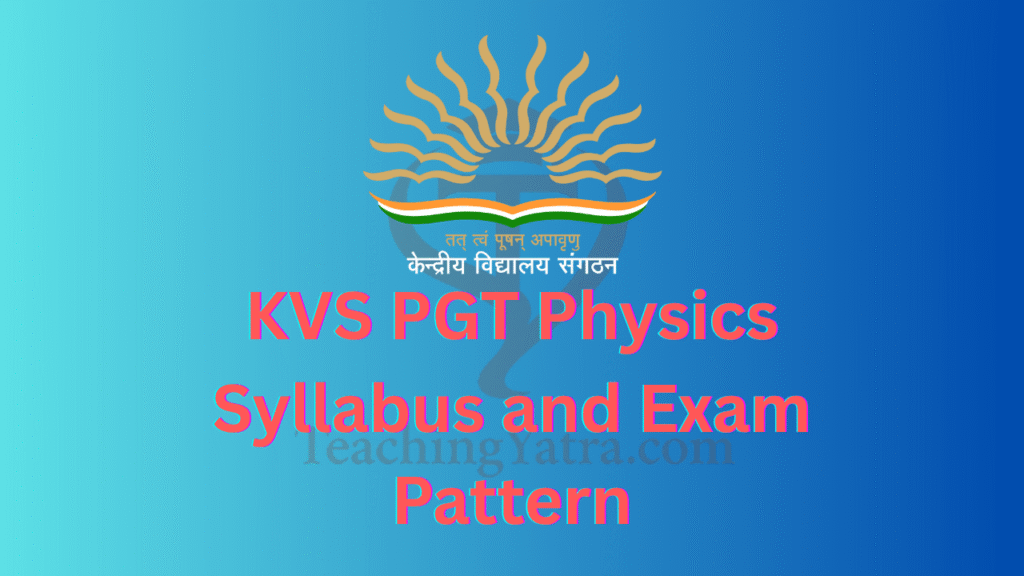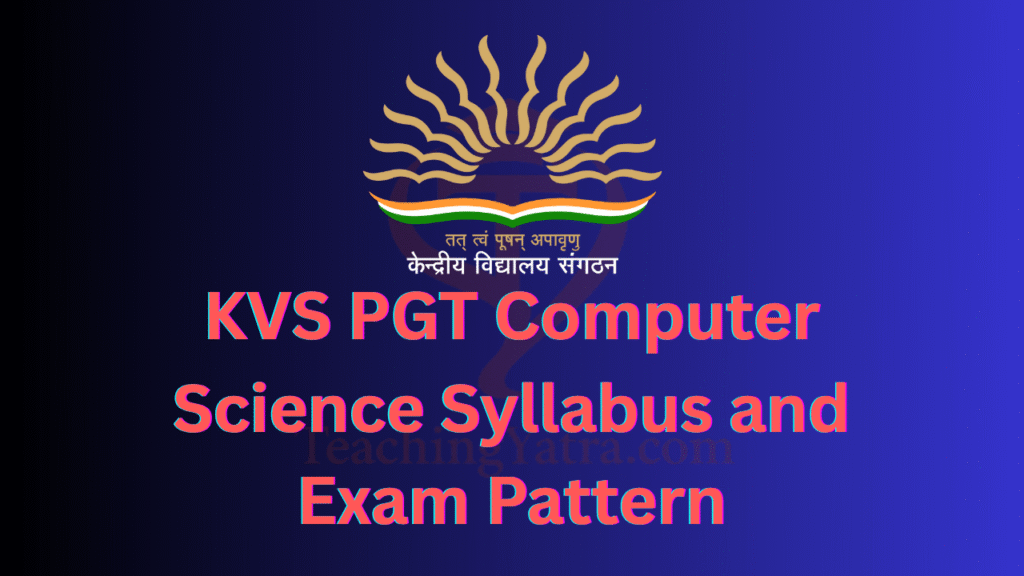
KVS TGT Syllabus 2025 and Exam Pattern for all subjects are covered in this article. The syllabus provides a clear roadmap to help candidates streamline their preparation effectively.
Kendriya Vidyalaya Sangathan (KVS) provides a valuable opportunity for aspiring teachers to build a career in Kendriya Vidyalayas across India. With 3619 vacancies announced for Trained Graduate Teachers (TGTs), it’s essential for candidates to go through the detailed syllabus to begin their preparation in a structured way. This article covers the complete KVS TGT Syllabus 2025 and exam pattern for all subjects, including Hindi, English, Sanskrit, Science, Mathematics, Social Studies, Physical & Health Education, Work Experience, and Art Education.
Table of Contents
KVS TGT Syllabus 2025: Overview
The KVS TGT (Trained Graduate Teacher) Syllabus 2025 outlines the subjects and topics you need to study for the KVS exam. The exam is conducted online across India, and the selection process includes a written test and an interview. For effective preparation, candidates should regularly check the official website for updates and thoroughly review the complete syllabus.
KVS TGT Syllabus Details
- Organization Name: Kendriya Vidyalaya School
- Conducting Body: Kendriya Vidyalaya Sangathan (KVS)
- Post Name: Trained Graduate Teacher (TGT)
- Vacancies: Will be announced later
- Job Location: All over India
- Application Mode: Online
- Exam Mode: Online/Offline
- Selection Process: Written Test + Interview
KVS TGT Exam Pattern 2025
The KVS TGT Exam 2025 consists of 180 multiple-choice questions carrying a total of 180 marks, to be completed in 3 hours. The exam is divided into four parts: Part I tests language skills through General English and General Hindi; Part II covers General Awareness, Reasoning Ability, and Computer Literacy; Part III focuses on Perspectives on Education and Leadership; and Part IV assesses in-depth knowledge of the candidate’s chosen subject. The exam is conducted in both English and Hindi, and the objective format helps evaluate the candidate’s overall teaching ability, subject expertise, and general awareness.
KVS TGT Exam Pattern & Marks Distribution
| Part | Subject | No. of Questions | Marks |
|---|---|---|---|
| Part I | General English | 10 | 10 |
| General Hindi | 10 | 10 | |
| Part II | General Awareness & Current Affairs | 10 | 10 |
| Reasoning Ability | 5 | 5 | |
| Computer Literacy | 5 | 5 | |
| Part III | Perspectives on Education & Leadership | 40 | 40 |
| Part IV | Subject Concerned (e.g., Science, Maths) | 100 | 100 |
| Total | 180 | 180 |
Detailed KVS TGT Syllabus 2025
The KVS TGT syllabus is divided into four main sections: language proficiency, reasoning and general awareness, teaching-related knowledge (pedagogy), and subject-specific content. Here’s the section-wise breakdown:
Scheme & Syllabus of Exam for Direct Recruitment of TGTs
Part I – Proficiency in Languages (20 Marks)
(a) General English (10 Questions)
- Reading comprehension
- Word power
- Grammar & usage
(b) General Hindi (10 Questions)
- पठन कौशल
- शब्द सामर्थ्य
- व्याकरण एवं प्रयुक्ति
Part II – General Awareness, Reasoning & Proficiency in Computers (20 Marks)
(g) General Awareness & Current Affairs (10 Questions)
(h) Reasoning Ability (5 Questions)
(i) Computer Literacy (5 Questions)
Part III – Perspectives on Education and Leadership (40 Marks)
(a) Understanding the Learner (10 Questions)
- Concept of growth, maturation and development, principles and debates of development, development tasks and challenges
- Domains of Development: Physical, Cognitive, Socio-emotional, Moral etc., deviations in development and their implications
- Understanding Adolescence: Needs, challenges and implications for designing institutional support
- Role of Primary and Secondary Socialization agencies, ensuring home-school continuity
(b) Understanding Teaching-Learning (15 Questions)
- Theoretical perspectives on learning – Behaviorism, Cognitivism, and Constructivism with reference to:
i. Role of teacher
ii. Role of learner
iii. Teacher-student relationship
iv. Teaching methods
v. Classroom environment
vi. Discipline and power - Factors affecting learning and implications for:
i. Classroom instructions
ii. Student activities
iii. Creating learning spaces - Planning and Organization of Teaching-Learning:
i. Syllabus and Curriculum concepts, Overt and Hidden Curriculum
ii. Competency-based education, Experiential learning
iii. Year Plan, Unit Plan, Lesson Plan
iv. Instructional materials and resources
v. ICT for teaching-learning
vi. Evaluation: Purpose, types, limitations; CCE, good tool characteristics
vii. Assessment: of learning, for learning, as learning – meaning, purpose, and planning - Enhancing Teaching-Learning processes: Classroom observation, feedback, reflection, dialogues
(c) Creating Conducive Learning Environment (6 Questions)
- Diversity, disability, and inclusion concepts; disability as a social construct
- Types of disabilities, identification, and interventions
- School mental health – curative, preventive, and promotive care
- Guidance and counselling
- Developing school and community as learning resources
(d) School Organization and Leadership (6 Questions)
- Leader as a reflective practitioner, team builder, initiator, coach, and mentor
- Perspectives on school leadership – instructional, distributed, transformative
- Vision building, goal setting, School Development Plan
- Strengthening teaching-learning via school processes: annual calendar, time-table, PTM, school assemblies, teacher forums, achievement data, school self-assessment
- Community partnerships, industry links, networking with nearby schools and HEIs – building learning communities
(e) Perspectives in Education (3 Questions)
- NEP-2020: Curriculum and Pedagogy – holistic and integrated learning, inclusive education, competency-based learning
- Child rights principles, safe school environment, RTE Act, 2009
- Historical view of National Education Policies
- School Curriculum Principles: Learning perspective, knowledge, curricular areas, school stages, pedagogy, and assessment
Part IV – Subject-specific Syllabus (100 marks)
Each candidate should prepare for the specific TGT subject they have applied for, such as Hindi, English, Sanskrit, Science, Mathematics, Social Studies, Physical & Health Education, Work Experience, Art Education, or other specialized subjects. The syllabus for these subjects is based on the NCERT curriculum for Classes 09 and 10 and includes advanced topics related to higher secondary level education.
Detailed KVS TGT Syllabus 2025 in Hindi
Part I – भाषाई प्रवीणता (20 अंक)
(a) General English (10 Questions)
- Reading comprehension
- Word power
- Grammar & usage
(b) सामान्य हिंदी (10 प्रश्न)
- पठन कौशल
- शब्द सामर्थ्य
- व्याकरण एवं प्रयुक्ति
Part II – सामान्य जागरूकता, तर्कशक्ति एवं कंप्यूटर में दक्षता (20 अंक)
(g) सामान्य जागरूकता एवं समसामयिक घटनाक्रम (10 प्रश्न)
(h) तर्कशक्ति क्षमता (5 प्रश्न)
(i) कंप्यूटर साक्षरता (5 प्रश्न)
Part III – शिक्षा और नेतृत्व पर दृष्टिकोण (40 अंक)
(a) शिक्षार्थी की समझ (10 प्रश्न)
- विकास, परिपक्वता और वृद्धि की अवधारणा, विकास के सिद्धांत एवं बहसें, विकासात्मक कार्य और चुनौतियाँ
- विकास के क्षेत्र: शारीरिक, संज्ञानात्मक, सामाजिक-भावनात्मक, नैतिक आदि; विकास में विचलन और उसके प्रभाव
- किशोरावस्था की समझ: आवश्यकताएँ, चुनौतियाँ, और संस्थागत सहायता के लिए सुझाव
- प्राथमिक और द्वितीयक सामाजिककरण एजेंसियों की भूमिका, विद्यालय और घर के बीच निरंतरता बनाए रखना
(b) शिक्षण-अधिगम की समझ (15 प्रश्न)
- अधिगम पर सैद्धांतिक दृष्टिकोण – व्यवहारवाद, संज्ञानात्मकता और निर्माणवाद, विशेष रूप से:
i. शिक्षक की भूमिका
ii. शिक्षार्थी की भूमिका
iii. शिक्षक-छात्र संबंध
iv. शिक्षण विधियाँ
v. कक्षा का वातावरण
vi. अनुशासन और शक्ति की समझ - अधिगम को प्रभावित करने वाले कारक और उनके प्रभाव:
i. कक्षा निर्देश की योजना
ii. छात्र गतिविधियाँ
iii. विद्यालय में अधिगम के लिए स्थान तैयार करना - शिक्षण-अधिगम की योजना और संगठन:
i. पाठ्यक्रम और पाठ्ययोजना की अवधारणा, प्रकट और अप्रकट पाठ्यक्रम
ii. दक्षता आधारित शिक्षा, अनुभवात्मक अधिगम
iii. वार्षिक योजना, इकाई योजना, पाठ योजना
iv. शिक्षण सामग्री और संसाधन
v. आईसीटी का उपयोग
vi. मूल्यांकन: उद्देश्य, प्रकार, सीमाएँ; सतत एवं समग्र मूल्यांकन, अच्छे उपकरण की विशेषताएँ
vii. अधिगम का मूल्यांकन: अधिगम के लिए, अधिगम के रूप में और अधिगम का मूल्यांकन - शिक्षण-अधिगम की गुणवत्ता में सुधार: कक्षा निरीक्षण, प्रतिक्रिया, चिंतन और संवाद
(c) अनुकूल अधिगम वातावरण का निर्माण (6 प्रश्न)
- विविधता, दिव्यांगता और समावेशन की अवधारणाएँ; दिव्यांगता को सामाजिक दृष्टिकोण से समझना
- दिव्यांगता के प्रकार, पहचान और हस्तक्षेप
- विद्यालय मानसिक स्वास्थ्य – उपचारात्मक, निवारक और संवर्धनात्मक देखभाल
- मार्गदर्शन और परामर्श की व्यवस्था
- विद्यालय और समुदाय को अधिगम संसाधन के रूप में विकसित करना
(d) विद्यालय संगठन और नेतृत्व (6 प्रश्न)
- नेतृत्वकर्ता के रूप में चिंतनशील अभ्यासी, टीम निर्माता, पहलकर्ता, कोच और मार्गदर्शक
- विद्यालय नेतृत्व के दृष्टिकोण – शैक्षणिक, वितरित और परिवर्तनकारी
- विज़न निर्माण, लक्ष्य निर्धारण और विद्यालय विकास योजना
- विद्यालय प्रक्रियाओं द्वारा शिक्षण को सशक्त बनाना: वार्षिक कैलेंडर, समय सारणी, अभिभावक-शिक्षक बैठकें, विद्यालय सभा, शिक्षक विकास मंच, उपलब्धि डेटा का विश्लेषण, विद्यालय आत्म मूल्यांकन
- समुदाय, उद्योग और आस-पास के स्कूलों व उच्च शिक्षा संस्थानों के साथ साझेदारी – अधिगम समुदाय बनाना
(e) शिक्षा में दृष्टिकोण (3 प्रश्न)
- नई शिक्षा नीति 2020: पाठ्यक्रम और शिक्षाशास्त्र – समग्र और एकीकृत अधिगम, समावेशी शिक्षा, दक्षता आधारित अधिगम
- बाल अधिकारों के मार्गदर्शक सिद्धांत, सुरक्षित विद्यालय वातावरण की व्यवस्था, नि:शुल्क एवं अनिवार्य शिक्षा अधिकार अधिनियम 2009
- राष्ट्रीय शिक्षा नीतियों का ऐतिहासिक दृष्टिकोण
- विद्यालय पाठ्यक्रम सिद्धांत: अधिगम दृष्टिकोण, ज्ञान, पाठ्यक्रम क्षेत्र, विद्यालय स्तर, शिक्षाशास्त्र और मूल्यांकन
Part IV – विषय-विशेष पाठ्यक्रम (100 अंक)
प्रत्येक अभ्यर्थी को उस विशिष्ट टीजीटी विषय की तैयारी करनी चाहिए जिसके लिए उसने आवेदन किया है, जैसे हिंदी, अंग्रेजी, संस्कृत, विज्ञान, गणित, सामाजिक अध्ययन, शारीरिक एवं स्वास्थ्य शिक्षा, कार्य अनुभव, कला शिक्षा, या अन्य विशिष्ट विषय। इन विषयों का पाठ्यक्रम कक्षा 9 और 10 के एनसीईआरटी पाठ्यक्रम पर आधारित है और इसमें उच्चतर माध्यमिक स्तर की शिक्षा से संबंधित उन्नत विषय शामिल हैं।
KVS TGT Syllabus 2025 Subject Wise
| KVS TGT English Syllabus 2025 | Click Here |
| KVS TGT Hindi Syllabus 2025 | Click Here |
| KVS TGT Mathematics Syllabus 2025 | Click Here |
| KVS TGT Science Syllabus 2025 | Click Here |
| KVS TGT Sanskrit Syllabus 2025 | Click Here |
| KVS TGT Social Science Syllabus 2025 | Click Here |
KVS TGT Syllabus PDF
The KVS TGT Syllabus PDF link is provided below for easy download. Candidates can click the link to access the complete syllabus, which covers subjects like Hindi, English, Sanskrit, Mathematics, Science, Social Studies, Physical & Health Education, Work Experience, and Art Education. This subject-wise syllabus helps candidates understand key topics and the exam pattern. Downloading and saving the syllabus PDF is recommended for better planning and organized preparation.

